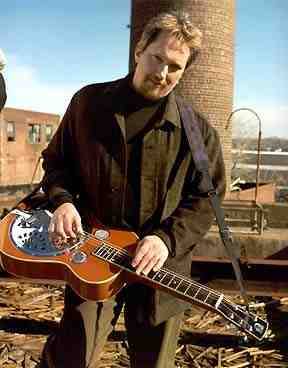 You know, in all the music writing and reviewing I’ve read over the past three decades or more, I don’t believe I’ve ever seen anyone write about onstage jokes.
You know, in all the music writing and reviewing I’ve read over the past three decades or more, I don’t believe I’ve ever seen anyone write about onstage jokes.
This occurred to me from the very start of the Jerry Douglas show in the lobby of the Krannert Center yesterday afternoon, because Jerry and his band brought along an ingredient that had so far been missing from the Ellnora Guitar Festival: that wonderful combination, very characteristic of traditional American music (old-time, Americana, bluegrass, those traditions) of humility and humor.
It probably has something to do with Appalachian cultural traditions, but for a century or more, those rural musicians have been making fun of themselves. You can see it in their band names, which invariably suggest that the musicians are confessing to being worthless low-lifes without an ounce of musical talent: the Bog Trotters, the Skillet Lickers.
And I was also thinking about stage jokes because that’s part of my trade, too: when I’m introducing bands, part of my job is to create an emotional lead-up that unites crowd and band, and good feeling and good humor are a valuable part of that bond.
So the jokes started at 5 p.m. sharp. Jerry Douglas had played an amazing sound check where they launched full-out into two or three songs and had the already-gathering crowd cheering wildly. Then they stopped, Jerry grinned and said, “See you at five,” and left the stage.
Riffing on this in my introduction 45 minutes later-and only when I started thinking about this column did I start realizing the comparisons with jazz, or at least with musical improvisation in general — I announced that the guy standing behind me was not only the Greatest Resonator Player in the History of the World, but that he had also just played the Greatest Sound Check in the History of the World.
He grinned. “Kinda cruel, really,” he chuckled, mocking himself.
And from then on, he produced a steady stream of these kinds of interlude entertainment. The previous night, he said, he’d played in the Library of Congress — but lest we should think he was bragging, he went on, “Whole lotta marble there. You could make an awful lot of kitchen counters out of it.”
It’s a high-wire art form, like stand-up. If you say anything onstage that is the slightest bit forced or inauthentic, it changes everyone’s sense of who you are. You can play a great song and then open your mouth to talk and lose the audience in half a second.
Jerry is in no such danger: he’s been doing this long enough to know, just as he knows on the dobro, what works and how to produce it. Announcing another song, he gestured to his fiddle player and said, “Luke here does something none of the rest of us are much good at.” Tiny pause while we wonder what anyone in this band of master musicians could possibly not do well. “It’s called singing.” Everyone laughs. “He just opens his mouth and sounds come out. Remarkable, really.”
When the band finished a terrific medley, he did a kind of phew and said, “That was a whole bunch of tunes. I don’t even know what they were.”
One break later, he brought out a new riff on all the old tuning-up jokes: “We tune because you care, folks.” And then, seeing that went down well, he took the line and played with it a little more: “We know you folks in Illinois know what a tuning’s all about.”
The show was a riotous success, and when the other musicians began to leave the stage, Jerry paused, made a half-turn to the side, and then turned back to the crowd. “I figure the leaving-the-stage-and-coming-back stuff is just a waste of everybody’s time,” he chuckled.
Once again he got a good laugh, which acted as a perfect comic beat-you know, that well-timed half-pause that allows the first joke to sink in and make the follow-up line feel like something new and slightly different. “”All that clapping and waiting — why, your hands’d be sore.”
It must take as long to perfect that kind of comic repertoire and sense of timing, that ease with the audience, that ease with yourself and your own onstage identity, as it does to perfect your music — maybe even longer. It’s noticeable that many of the younger musicians, no matter how incredible their musical chops, don’t have quite the range of richness in their verbal delivery.
Later in the evening, Keb’ Mo’ brought out his own brand of self-mocking humor, and that, too, went down well, and it showed that his wonderful songwriting has a non-musical counterpart in between numbers.
I was going to quote some lines I scribbled down, but you know what? I’ve sort of realized why nobody writes about onstage humor. It’s like writing out song lyrics: without the music, the words look lifeless on the page. The jokes are live events: they depend on what has just been said or played, on the mood of the crowd, on something one of the other band members said as an onstage aside nobody in the audience heard. They are spontaneous compositions, not stand-alones. You had to be there.
 Tim Brookes is the author of: Guitar: An American Life and the forthcoming The Greatest Guitarist in the History of the World. He’s in town to act as emcee, interviewer and man-on-the-sidewalk for the Ellnora Guitar Festival at the Krannert Center. Check out his blog at www.timbrookesinc.com.
Tim Brookes is the author of: Guitar: An American Life and the forthcoming The Greatest Guitarist in the History of the World. He’s in town to act as emcee, interviewer and man-on-the-sidewalk for the Ellnora Guitar Festival at the Krannert Center. Check out his blog at www.timbrookesinc.com.








